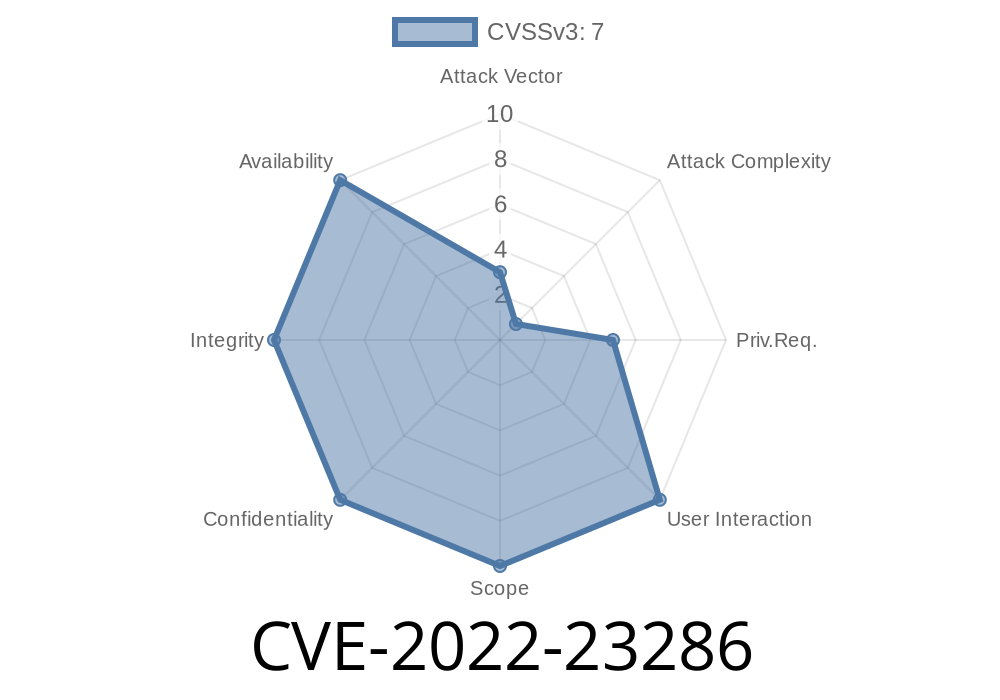---
The vulnerability tracked as CVE-2022-23286 is a serious flaw in Windows that can let attackers gain higher privileges than they should have. This bug exists in the Cloud Files Mini Filter Driver (cldflt.sys), a core part of Windows that handles cloud file operations (think OneDrive and other cloud sync).
Let’s dive into what the issue is, how it might be exploited, and what you can do to stay safe.
What is the Windows Cloud Files Mini Filter Driver?
Windows uses a driver called cldflt.sys to handle files that are stored in the cloud but accessed locally. It’s a type of “minifilter” driver, sitting low in the Windows kernel stack, watching and handling file requests between your programs and your cloud storage.
If there’s a bug here, it can be a big deal—attackers could use it to escalate their privileges to SYSTEM level, which is pretty much game over for your machine.
The Vulnerability Explained
According to Microsoft’s own advisory, the problem is an Elevation of Privilege (EoP) vulnerability. That means a user with limited rights could exploit this bug to get higher rights—potentially full admin or even SYSTEM.
Technical Details
* The bug exists due to improper input validation in the driver.
* A malicious local user can send specially crafted requests or manipulate file operations such that the handler in cldflt.sys misbehaves.
* This could result in privilege escalation—running unauthorized code in the context of the SYSTEM account.
What’s Needed to Exploit It?
* Local access: The attacker needs to be able to execute code on your machine.
* No user interaction required: You don’t have to click anything. If the attacker gets code to run, they can exploit it right away.
Exploit Example
Here’s a simplified proof of concept that demonstrates how an attacker could try poking at the vulnerable driver. (For educational purposes only!)
#include <Windows.h>
#include <stdio.h>
#define DRIVER_DEVICE "\\\\.\\CldFlt"
int main() {
HANDLE hDriver = CreateFileA(
DRIVER_DEVICE,
GENERIC_READ | GENERIC_WRITE,
,
NULL,
OPEN_EXISTING,
,
NULL);
if (hDriver == INVALID_HANDLE_VALUE) {
printf("[-] Failed to open driver: %u\n", GetLastError());
return -1;
}
DWORD bytesReturned;
// The control code and input buffer would be discovered by reverse engineering the driver.
DWORD exploitMagicControlCode = x222004; // Fake, for example only
char maliciousBuffer[100] = {};
// Fill maliciousBuffer with crafted values...
BOOL result = DeviceIoControl(
hDriver,
exploitMagicControlCode, // Overwrite with the vulnerable IOCTL
maliciousBuffer,
sizeof(maliciousBuffer),
NULL,
,
&bytesReturned,
NULL);
if (result) {
printf("[+] Exploit attempt sent to driver.\n");
} else {
printf("[-] Exploit failed: %u\n", GetLastError());
}
CloseHandle(hDriver);
return ;
}
> Note: This code won’t work out of the box—finding the right IOCTL and crafting the input requires deep analysis of cldflt.sys. But this is the general technique used in real world exploits.
Permanently backdoor your device
This is why local privilege escalation vulnerabilities like this are so tempting for ransomware operators and advanced attackers.
Patching and Mitigation
Luckily, Microsoft released a patch back in February 2022 as part of their regular Patch Tuesday updates. You can find details and download links here:
- Microsoft Security Update Guide - CVE-2022-23286
- Patch Notes (Microsoft)
References
- CVE-2022-23286 - Microsoft Security Advisory
- NIST National Vulnerability Database: CVE-2022-23286
- ExploitDB (no current public PoC at this time)
Final Thoughts
Security bugs in core Windows drivers like cldflt.sys are rare but incredibly dangerous. CVE-2022-23286 shows how even cloud features we use every day can open doors for attackers if not properly secured.
If you’re a regular user, don’t panic—just make sure your Windows is always updated. If you’re in charge of keeping networks secure, check that your fleet is patched. Threat actors move fast, but simple patching can keep you a big step ahead.
Timeline
Published on: 03/09/2022 17:15:00 UTC
Last modified on: 05/23/2022 17:29:00 UTC
